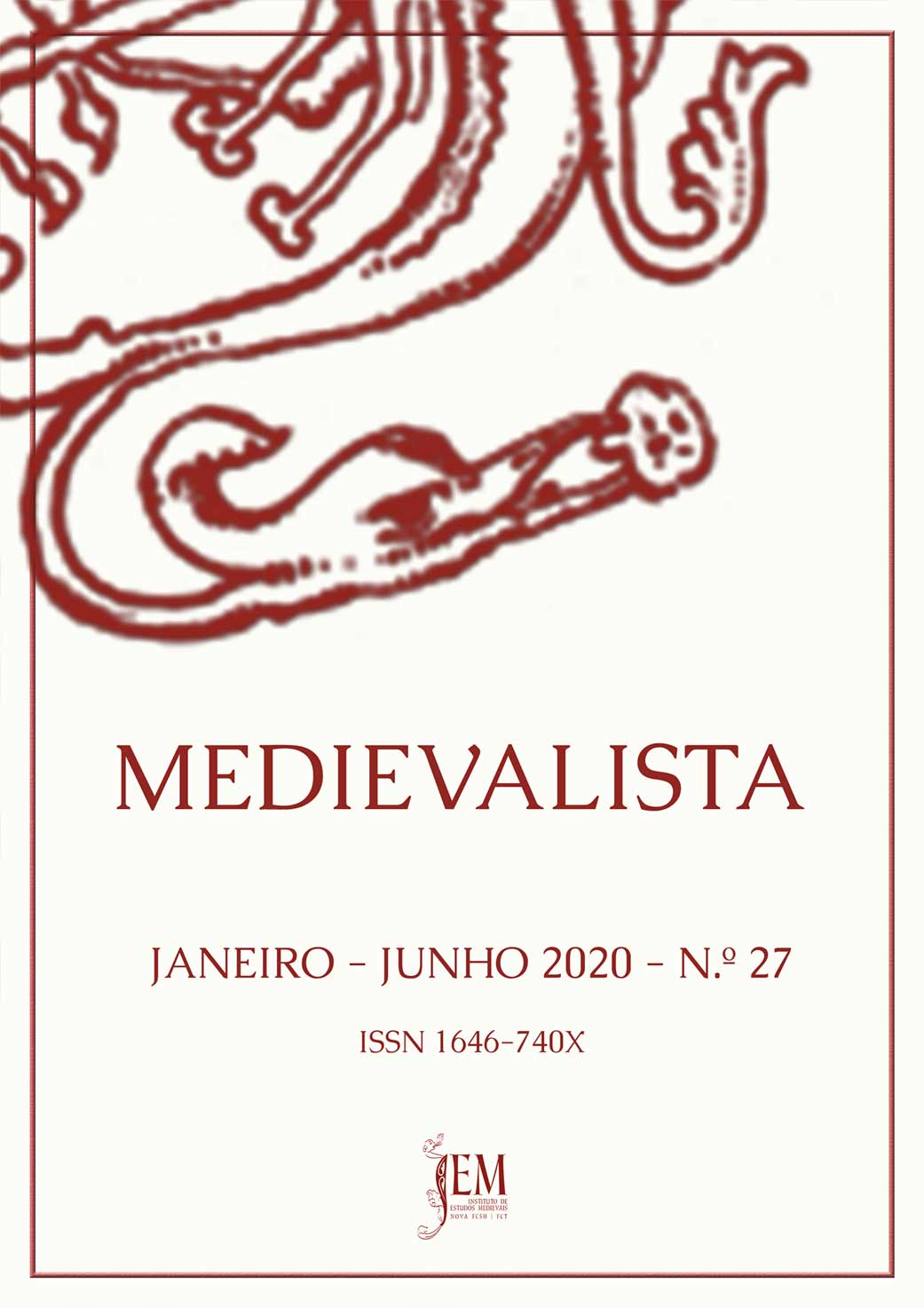The king that faints and the angry queen: the dynastic crisis of 1383-1385 through emotions in the chronicles of Fernão Lopes
DOI:
https://doi.org/10.4000/medievalista.2804Keywords:
1383-1385 dynastic crisis, History of emotions, Fernão LopesAbstract
The 1383-1385 dynastic crisis has been studied by generations of historians. This article aims to contribute to the debate through a florescent historiographical field that does not seem to have been used to analyse the main narrative of the events, written by Fernão Lopes: the History of Emotions. We will study the emotional palette expressed by the kingdom’s official chronicler and perceived by his Portuguese medieval readers in an attempt to understand how it sustains the rise to the throne of the Master of the Military Order of Avis. The work is structured around three royal couples and the emotions expressed and provoked by them: Leonor Teles and D. Fernando as the bad example because of their emotional imbalance that drives the kingdom to chaos and the inadequacy of the roles they play to what is expected from them; Juan I of Castile and Beatriz of Portugal who arise despair and negative emotions; João I and Philippa of Lancaster who help to restore normality by their balanced and positive performance. In each of these cases the first element mentioned is dominant on the references.
Bibliography
Studies
ALTHOFF, Gerd – “Ira regis: Prolegomena to a history of royal anger”. in ROSENWEIN, Barbara H. (ed.) – Anger’s past: the social uses of an emotion in the Middle Ages. Ithaca: Cornell University Press, 1998, p. 59.
BERGQVIST, K. – “Tears of Weakness, Tears of Love: Kings as Fathers and Sons in Medieval Spanish Prose”. in FÖRNEGÅRD, Per; KIHLMAN, Erika; ÅKESTAM, Mia; ENGWALL, Gunnel – Tears, Sighs and Laughter: Expressions of Emotions in the Middle Ages. Estocolmo: KVHAA, 2017, pp.77-97.
BERLIN, Henry – “The willing reader of Duarte’s Leal Conselheiro”. Journal of Medieval Iberian Studies Vol. 5, n.º2 (2013), 204-219.
BROOMHALL, Susan – Authority, Gender and Emotions in the Late Medieval and Early Modern England. Nova Iorque: Palgrave Macmillan, 2015.
BROOMHALL, Susan (ed.) – Early Modern Emotions: An Introduction. Londres: Routledge, 2017.
DOUBLEDAY, Simon – “Anger in the Crónica de Alfonso X”. Al-Masaq Vol. 27, n.º1 (2015) pp. 61-76.
FORONDA, François – “El miedo al rey: fuentes e primeras reflexiones acerca de una emoción aristocrática en la Castilla del siglo XIV”. e-Spania [Em Linha] 4 (dezembro de 2007) [Consultado a 19 abril 2018]. Disponível em https://journals.openedition.org/e-spania/2273
LYNCH, Andrew – “Emotional Community”. in BROOMHALL, Susan (ed.) – Early Modern Emotions: An Introduction. Londres: Routledge, 2017, p. 3.
MUÑOZ FERNANDEZ, Ángela – “Llanto, palavras y gestos. La muerte e el duelo en el mundo medieval hispânico (morfologia ritual, agencias rituales y controversias)”. Cuadernos de historia de España 83 (2009), pp. 107-139.
NAGY, Piroska – Le don des larmes au Moyen Âge. Paris: Albin Michel, 2000.
NAGY, Piroska; BOQUET, Damien – Sensible Moyen Âge. Une histoire des émotions dans l’Occident Medieval. Paris: Seuil, 2015.
NOGALES RINCÓN, David – “Admiración, extrañeza y construcción del discurso narrativo de la crónica real. Emoción de la maravilla y representación política en la Castilla bajomedieval”. e-Spania [Em Linha] 27 (junho de 2017), [Consultado a 19 abril 2018]. Disponível em http://journals.openedition.org/e-spania/26616
ORNING, Hans Jacob – “Royal anger between Christian doctrine and practical exigencies”. Collegium medievale: interdisciplinary journal of medieval research 22 (2009), pp. 34-54.
REDDY, William M. – The Navigation of Feeling. A Framework for the History of Emotions. New York, 2001.
RODRÍGUEZ PORTO, Rosa M. – “La Crónica Geral de Espanha de 1344 (ms. 1 A de la Academia de Las Ciências y la tradición alfonsí”. e-Spania [Em Linha] 25 (outubro de 2016), [Consultado a 19 abril 2018]. Disponível em http://journals.openedition.org/e-spania/25911
ROSENWEIN, Barbara H.; CRISTIANI, Riccardo – What is the History of Emotions?. Cambridge: Polity Press, 2018.
ROSENWEIN, Barbara H. – Emotional Communities in the Early Middle Ages. Ithaca & London: Cornell University Press, 2006.
ROSENWEIN, Barbara H. (ed.) – Anger’s Past. The social uses of an emotion in the Middle Ages. Ithaca and London: Cornell University Press, 1998.
SCHEER, Monique – “Are emotions a kind of practice (and this is what makes them have history)? A bourdieuian approach to understanding emotion”. History and Theory 51 (maio de 2012), pp.193-220.
SOUSA, Bernardo Vasconcelos e – “Medieval Portuguese Royal Chronicles. Topics in a discourse of Identity and Power”. e-Journal of Portuguese History [Em Linha] Vol. 5, n.º2 (2007), [Consultado a 19 abril 2018]. Disponível em http://www.scielo.mec.pt/scielo.php?script=sci_arttext&pid=S1645-64322007000200001&lng=pt&nrm=iso.
VINDEL PÉREZ, Ingrid – Crónica de 1344. Edición crítica y estudio. Bellaterra, Universitat Autònoma de Barcelona, 2016. Tese de Doutoramento. Disponível em https://ddd.uab.cat/record/167824?ln=ca
Downloads
Downloads
Published
How to Cite
Issue
Section
License
Copyright (c) 2024 Medievalista

This work is licensed under a Creative Commons Attribution 4.0 International License.





















